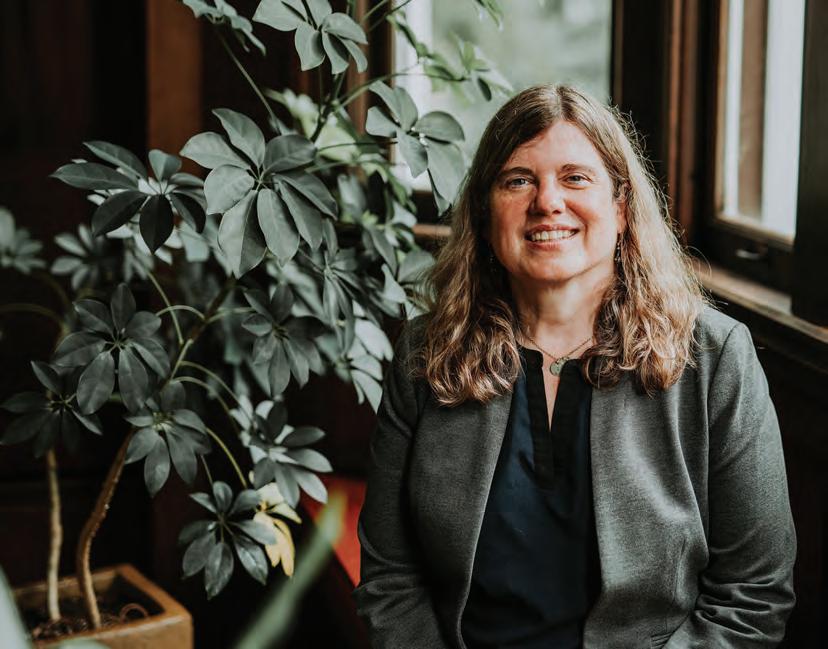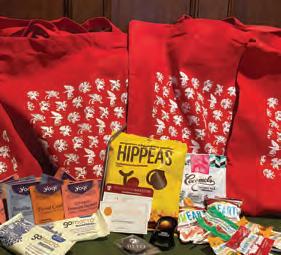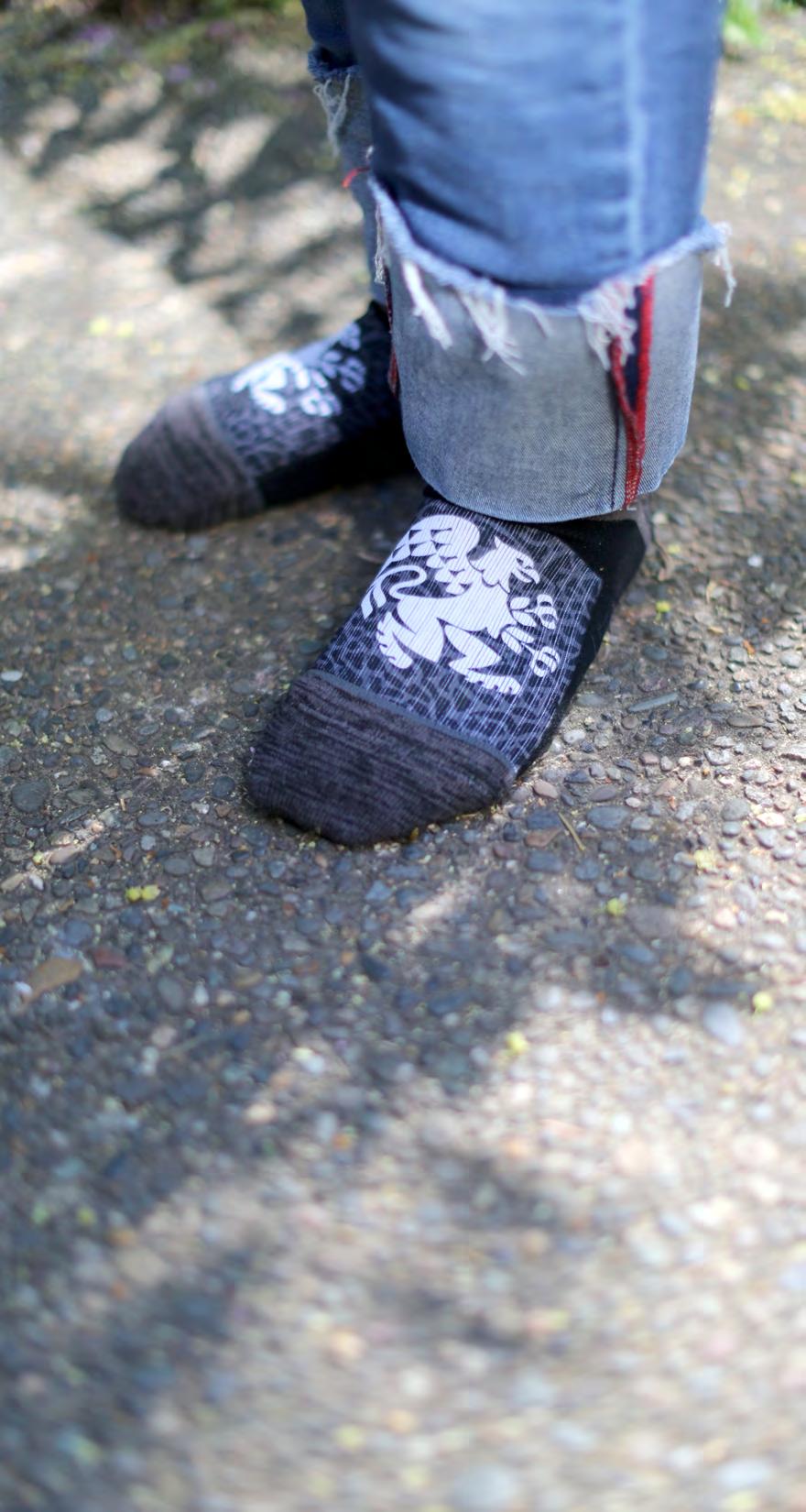
16 minute read
Eliot Circular
news from campus
Love Is a Radical Act
Perhaps you’ve seen them around campus: ceramic hearts, bright red, dangling from the arms of trees, glinting in the elusive sunlight. Reminders of love and loved ones that are perhaps more precious than ever right now as the global pandemic continues to disconnect us from one another.
The secret agents behind this festoonery? President Audrey Bilger and her wife, Cheryl Pawelski.
Ten years ago, a friend and former student of Bilger’s named Sam MacKenzie embarked on an interactive art installation with her late wife, Kelly Keigwin, titled Love Is a Radical Act. They created small ceramic hearts that they hung up all around Vancouver, Washington. They called the activity “(he)art bombing” and soon began giving the hearts to friends and encouraging them to do “bombings” of their own.
When Bilger first learned about the hearts, she ordered some as gifts for friends and liked them so much that she got more. Here at Reed, she has given one to each of her assistants, Dawn Thompson and Sierra Ellis Turpin, and she put one in her office near her desk.
Bilger regards the hearts as cheerful eye-catchers that remind her “of friends, loved ones, and our interconnectedness.” Six months into the pandemic, she had a burst of inspiration. She and Cheryl surreptitiously hung a dozen hearts on trees around campus. She wanted to invoke those feelings of love and connection in the campus community and lift people’s spirits.
So if you spot a heart while walking around campus, take a moment to contemplate the radical act of love—and what it means for you. — JOSH COX ’18

photo by lauren labarre
Professor Shapes Tax Policy for Biden

Prof. Kimberly Clausing, the Thormund A. Miller and Walter Mintz Professor of Economics at Reed, was sworn in last month as a deputy assistant secretary in the U.S. Treasury Department, where she will lead the Office of Tax Analysis for the BidenHarris administration.
In this role, Prof. Clausing will be involved in the administration’s tax policy efforts to address the many challenges facing the country, including the pandemic, economic recovery, climate change, and societal inequities.
“The tax code reflects our values as a society,” Clausing said. “Under the Biden administration, I hope that we can modernize our tax code to be more true to our values, and to respond seriously to the challenges of income inequality, climate change, and the pressing need to create a more equitable, open global economy.”
Clausing is an expert on international trade, international finance, public finance, and corporate tax avoidance. She is the author of Open: The Progressive Case for Free Trade, Immigration, and Global Capital and scores of scholarly papers and articles; major media outlets such as the New York Times and the Wall Street Journal often lean on her expertise to explain byzantine economic theory.
“Howl” Unleashed

The raw, powerful, first-known recording of one of the most influential American poems of the late 20th century—Allen Ginsberg’s ”Howl”—will soon be available to the public, 65 years after Ginsberg read it before an awestruck audience at Reed College. “Howl” is widely regarded as a seminal literary work with a profound influence on the Beat generation and the counterculture movement of the 1960s and 1970s. “This poem is really important,” says Prof. Pancho Savery [English and humanities]. “Every PHOTO COURTESY OF USU SPECIAL COLLECTIONS, MERRILL-CAZIER LIBRARY few years, a new generation rediscovers it— and gets turned on by it.”
Its first public reading took place at San Francisco’s famous Six Gallery in October 1955. Along with Ginsberg, the evening included readings by Gary Snyder ’51, Philip Whalen ’51, Philip Lamantia, and Michael McClure. Poet Kenneth Rexroth was the emcee; Jack Kerouac, Lawrence Ferlinghetti, and Neal Cassady were in the audience. Unfortunately, no one thought to record this historic moment. Ginsberg was recorded reading the poem at Berkeley a few months later in March 1956, and for many years literary historians thought that recording was the first.
But they were wrong. Earlier in 1956, Ginsberg and Snyder went hitchhiking “I saw the best minds of my generation destroyed by madness, starving hysterical naked...” Allen Ginsberg voiced through the Pacific Northwest and arrived the mood of the Beat Generation with his epic poem “Howl.” at Reed, where they decided to hold a poetry reading in the common room of the Anna Mann demonstrably true as we Reed President Audrey Bilger. They struck dormitory. On February hear Ginsberg drawing up a chance conversation on the sidelines 14, Ginsberg read the first in great breaths at the with Gregory MacNaughton ’89, the edusection of “Howl,” still very anaphoric head of every cation outreach coordinator of Reed’s Cooley much a work in progress. line. It’s a recording to be Gallery, who mentioned the tape. And this time, someone breathed with as much as Pawelski, a Grammy Award-winning brought a tape recorder. listened to.” record producer, has long been interested
“The Reed recording of The reel-to-reel tape in Ginsberg’s writing and performances. She February 1956 is superb, sat unnoticed in Reed’s obtained permission from Ginsberg’s estate faithful in pitch and supe- Hauser Library for more to release the recording, titled Allen Ginsberg rior in sound quality to any Omnivore Recordings will release Allen Ginsberg At Reed College with liner notes than 50 years until Suiter at Reed College—The First Recorded Reading presently known 1950s ver- by Prof. Pancho Savery and cover art by rediscovered it in 2008 of Howl & Other Poems. sion,” writes historian John Gregory MacNaughton ’89. while researching a biog- The new release features extensive liner Suiter. “Allen is miked close- raphy of Snyder. This dis- notes written by Prof. Savery, an authorly, so his volume is even throughout. His covery made waves in scholarly and literary ity on Beat poets, with calligraphy by enunciation is clear, his timing perfect; he circles, but the recording itself remained MacNaughton featured on the cover. The never stumbles. His accent is classic North somewhat obscure. Then in 2019, Cheryl release date is April 2. Jersey Jewish, intelligent and passion- Pawelski, cofounder of Omnivore Recordings, ate. The poet-as-saxman metaphor comes attended a Reed rugby match with her wife,


WREATHED IN SEA-REED
We’re proud to announce a new Reed affinity group. Sea-Reed is a network meant to connect students and alumni working in, on, or around the ocean, or who are interested in careers in ocean sciences or policy. The group was launched by marine scientist Rennie Meyers ’15, who works at the National Science Foundation, and career advisor Julia Burrows at the Center for Life Beyond Reed. More than 70 Reedies have already signed up; one of them is Sasha Vukasovich ’20 (above), who majored in biology and anthropology and studied the relationship between people and the ocean through the lens of climate change. Sasha now works teaching students, who are often new to sailing and life at sea, about ocean science, environmental management, nautical science, and maritime history from the deck of large sailing vessels on the open ocean.
Find out more at groups.google.com/a/ groups.reed.edu/g/seareed
STATS MAJOR WINS PRESTIGIOUS AWARD
Math-stats major Simon Couch ’21 won the John M. Chambers Statistical Software Award, honoring the development of computational tools for the statistical profession by a graduate or undergraduate student.
The competition is sponsored by the Statistical Computing and Statistical Graphics Sections of the American Statistical Association.
Simon won the award for Stacks, a software package which allows a user to build ensemble models using tidy data principles. Simon started Stacks while interning at RStudio PBC and finished the package as part of his Reed senior thesis.
To learn more about the power of Stacks, check out Simon’s blog at blog--simonpcouch. netlify.app

THIS PODCAST IS ON FIRE
(DON’T WORRY—YOUR THESIS IS FINE)
Burn Your Draft, a podcast hosted by Frank Tangherlini ’22, engages Reed seniors and recent graduates in discussion about the thesis experience.
New episodes are released every few weeks. Available on Apple Podcast, Stitcher, Spotify, or wherever you get your podcasts.
Burn Your Draft episodes:
#1 “Land Pricing in Portland,” with Ryan Kobler ’20, economics/math #2 “Translating Ancient Chinese Jokes,” with Jake Buck ’20, Chinese #3 “UFOs and the People Who Love Them,” with Molly Johnson ’19, sociology #4 “China’s New Silk Road,” with Soha Ahmed ’20, economics #5 “Gender Pronoun Use at Reed,” with Jade Fung ’20, psychology #6 “Splitting Photons,” with Ely Eastman ’20, physics #7 “An Illusion of Spontaneity,” with Rosie Tabachnick ’19, theater #8 “Trauma and Stand-up Comedy,” with Ella Fisher ’20, English #9 “DNA Investigations of Tiny Crustaceans,” with Nick Thayer ’20, biology #10 “The Politics of Pat Robertson,” with Lewis Chapman ’19, political science #11 “Microfinance in Mexico,” with Alyse Cronk ’20, economics #12 “Smoke Gets In Your Eyes,” with Gerry Peña-Martinez ’20, art/economics
blogs.reed.edu/burn-your-draft
Burn Your Draft is made possible through generous funding from Seth Paskin ’90, podcast host of The Partially Examined Life. Seth’s vision and guidance is invaluable. Thank you, Seth! Producer Nate Martin ’16 manages the podcast for the Center for Life Beyond Reed.
photo by lauren labarre
Dean of the Faculty Pushes Back at Wall Street Journal Column on Grades

Prof. Kathy Oleson, the dean of the faculty, forcefully defended Reed’s grading policy after it came under attack in a recent diatribe in the Wall Street Journal by columnist Andy Kessler.
Kessler, who pens the Inside View column in the Journal, threw shade at Reed and other liberal arts colleges for their supposed lax approach to grading. “Many schools, like Hampshire College, Antioch University and Reed College, don’t even bother with meaningful grades—feelings might get hurt,” he wrote. “Reed students do receive a looseygoosey grade-point average, but ‘papers and exams are generally returned to students with lengthy comments but without grades affixed.’”
He cited Reed’s grading policy to support his contention that equity initiatives threaten to promote mediocrity, undermine the concept of merit, and generally signal the downfall of America.
Prof. Oleson pushed back hard.
Kessler’s first mistake lay in suggesting that Reed subscribes to the everyonegets-a-trophy philosophy. In fact, Reed is renowned for academic rigor, exacting standards, and for defying the grade inflation that is rampant in higher education. Standards at Reed are so demanding that a perfect 4.0 GPA is almost unheard of— fewer than 10 students have achieved this in the last 25 years.
More important—and more meaningful—than grades, however, is the ongoing feedback that students receive from their professors, a practice that Prof. Oleson noted “fosters content proficiency, more creativity and intellectual curiosity, and stronger outcomes.”
Prof. Oleson also rejected the column’s central premise. “Diversity, equity, and inclusion initiatives actually lead to a more meritocratic society by giving more students access to top-quality education,” she said.
Prof. Oleson is a social psychologist who has devoted much of her career to finding ways to make the classroom more inclusive—and more effective. She is the author of Promoting Inclusive Classroom Dynamics in Higher Education and has authored scores of scholarly articles on topics such as social identity theory, unconscious bias, uncertainty, self-doubt, self-handicapping, stereotyping, and even productive procrastination.
PROF. OLESON’S RESPONSE
Andy Kessler’s commentary, “Mediocrity Is Now Mandatory” (WSJ February 2021), equates Reed’s grading philosophy, which measures academic achievement by intellectual growth, with fragility and claims that Reed’s faculty “don’t even bother with meaningful grades.” Kessler cites the grading policy at Reed as evidence that diversity, equity, and inclusion initiatives threaten to dethrone merit and promote a culture of mediocrity. This conjecture indicates a fundamental misunderstanding and mischaracterization of Reed’s approach to learning.
First, a conventional letter grade for each course is recorded for every student at Reed. In fact, Reed is renowned for an absence of grade inflation that reflects the rigor of our academic program and the high standards set by the faculty. This being said, it is true that letter grades are not shared with students unless requested. Instead, students receive robust ongoing feedback on their work, including lengthy comments on papers and exams. This practice fosters content proficiency, more creativity and intellectual curiosity, and stronger outcomes. Furthermore, diversity, equity, and inclusion initiatives actually lead to a more meritocratic society by giving more students access to top-quality education.
Demonstrating the power of our approach, Reed ranks fourth in the nation among colleges and universities in the percentage of graduates who go on to earn doctoral degrees. (Source: National Science Foundation and Integrated Postsecondary Education Data System data, based on doctoral degrees awarded 2005–2014.) Bottom line, we know that when meeting the challenges of “real life,” the grades you received in college don’t matter if you didn’t learn the material.
Kathryn C. Oleson Dean of the Faculty and Professor of Psychology Reed College

photo by lauren labarre
DEVASTATION ON BOTSFORD DRIVE
A vicious winter storm wrought havoc on the Portland area last month, flattening buildings, trees, and power lines, and hurling so much ice and snow at the Sports Center that the roof over Gym I and Gym II collapsed.
Fortunately the building’s electronic monitoring system sounded the alarm several hours before the cave-in and no one was injured.
At approximately 7:59 a.m. on February 15, the roof gave way with a deafening roar, pulverizing the basketball court, the pingpong tables, the kickboxing zone, and the Covid-19 testing area.
Resourceful staff from the Community Safety Office and the Phys Plant worked through the night to make sure no one was injured. Read more at www.reed.edu/ reed-magazine.
Diversity & Inclusion Affinity Networks
Identity, Visibility, Community
The Alumni Board Diversity & Inclusion Committee is launching three identitybased affinity networks. While the groups are identity-specific, they are also inherently intersectional, and alumni should join any and all groups with which they self-identify.
ALUMNI OF COLOR NETWORK The Alumni of Color (AOC) Network seeks to enhance the alumni experience for Reedies from historically marginalized racial and ethnic communities.
FIRST-GEN ALUMNI NETWORK The First-Gen Alumni Network seeks to enhance the alumni experience for Reedies from all backgrounds whose parents or legal guardians have not received a four-year bachelor’s degree.
LGBTQIA2S+ ALUMNI NETWORK The LGBTQIA2S+ Alumni Network seeks to enhance the alumni experience for Reedies who identify as lesbian, gay, bisexual, transgender, queer, two spirit, or who claim any number of diverse sexualities or gender identities.
Ready to register? Scan this code to sign up.
News of the Alumni Association • Connecting Reed Alumni Around the Globe
EDITED BY KATIE RAMSEY ’04
VIRTUAL PROGRAMMING — JOIN US ONLINE!

Virtual Reunions Owing to the uncertainty of the pandemic— and with the goal of safety for all—Reunions 2021 will be held virtually from June 7–13. Last year’s Virtual Reunions and Alumni College were successful in drawing alumni together across the world, and we are looking forward to having a longer lead time this year to create an even better experience. Reunion planning committees are being formed for classes ending in 1s and 6s, but all alumni from all class years are encouraged to attend. Email alumni@reed.edu to get involved in class gatherings, and visit alumni.reed.edu for general Reunions information.
Alumni College Goes Green In honor of the Environmental Studies program’s 10-year anniversary, Alumni College 2021 will focus on the environment. Alumni College will take place June 4–6 and will offer lectures by alumni and faculty who are working to fight the effects of global climate change via policy, research, technology and education. All sessions are free for alumni to attend and will offer time for alumni discussion (almost like a Hum conference!). Visit alumni.reed.edu for details. Reed Remote Talks is a series of virtual seminars hosted by Alumni Programs. We feature Reed alumni and faculty who share their knowledge and experience in an array of thought-provoking topics. Recent speakers include Sam Fromartz ’80, editor in chief of the Food & Environment Reporting Network; Acacia Parks ’03, chief science officer of Happify Health; and Pamela Ronald ’82, researcher of climate-resistant rice. To register for upcoming talks or to watch recordings of past talks, visit alumni.reed.edu/reed-remote.
Reed Remote Virtual Book Club is a great way to share the critical discourse you enjoyed from Reed conferences of yore. With the help of a professional book club facilitator, we are reviewing books from Hum 411 (Senior Symposium), and it’s not too late to join the discussion on our current book, Locking Up Our Own: Crime and Punishment in Black America by James Forman Jr. The book club convenes on a user-friendly and private online forum where you can discuss the books on your own timeline. Join (it’s free!) on alumni.reed.edu/reed-remote. The Foster-Scholz Club will host a virtual talk with Prof. Derek Applewhite [biology] on Tuesday, April 6 at 3 p.m. (PST) on his research in microscopy and cell imaging. Prof. Applewhite believes microscopy and cell imaging techniques have “revolutionized the field” of biology by allowing scientists to observe phenomena at a level of detail previously unimaginable even a few short decades ago. All alumni whose preferred class year is 40 or more years ago are invited to attend this talk, which promises to be as fascinating as it is visually stimulating!

The Foster-Scholz Club will host a virtual talk with Prof. Derek Applewhite.

CARE PACKAGE THANK-YOU
A big thank-you to the 51 alumni who sponsored care packages for students staying on campus between Thanksgiving and Paideia. 82 students each received a tote bag filled with goodies that included a month-long subscription to Headspace (a meditation app), a gift certificate to the Reed Bookstore, healthy snacks, tea, and some Reed branded swag. Thanks for giving our students a bit of alumni community support.
MARCH CAMPAIGN 1,000 FOR $100,000 FOR FINANCIAL AID

This March 17–31, make a gift to financial aid and help us unlock $100,000 from a generous donor. Member of the classes of 2011–2020? Your gift will go directly to the Help a Reedie Out scholarship!
FOLLOW US FOLLOW REED!
FACEBOOK https://www.facebook.com/ ReedAlumni/ INSTAGRAM https://instagram.com/ reedcollege/ TWITTER @reed_alumni or https://twitter.com/reed_alumni LINKEDIN Reed College Alumni Professional Network or https://www.linkedin.com/ groups/59769






